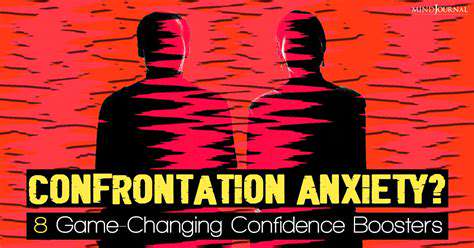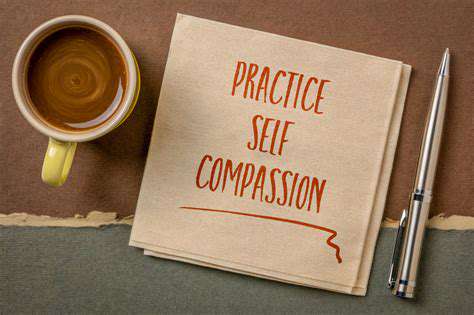Dealing with Confrontation Anxiety: Strategies for Success

Building Confidence and Assertiveness Skills
Understanding the Roots of Confrontation Anxiety
Confrontation anxiety, a common experience, often stems from a complex interplay of past experiences, learned behaviors, and perceived threats. Individuals who have experienced negative or uncomfortable interactions in the past may develop a fear of conflict, associating it with rejection, criticism, or negative consequences. This fear can be deeply ingrained, leading to avoidance behaviors and a reluctance to address challenging situations directly. Understanding the underlying causes is the first step towards overcoming this anxiety and developing healthy conflict resolution skills.
Beyond past experiences, societal pressures and expectations can also contribute to confrontation anxiety. Our culture often values harmony and avoids direct confrontation, which can inadvertently reinforce the idea that conflict is something to be feared or avoided. This societal conditioning can make it difficult for individuals to assert themselves or express their needs effectively, further exacerbating the anxiety associated with confrontation.
Identifying Your Triggers and Patterns
A crucial step in managing confrontation anxiety is identifying your specific triggers. What situations or types of interactions tend to make you feel anxious? Is it disagreements at work, difficult conversations with loved ones, or public speaking? Once you pinpoint these triggers, you can begin to develop strategies to cope with them more effectively.
Recognizing patterns in your responses to confrontation can also be helpful. Do you tend to withdraw, become passive-aggressive, or lash out? Understanding these patterns allows you to become more aware of your reactions and choose more constructive ways of interacting in challenging situations.
Developing Assertiveness Skills
Assertiveness is the ability to express your needs, thoughts, and feelings respectfully and confidently while also acknowledging the perspectives of others. Developing assertiveness skills is crucial for managing confrontation anxiety because it empowers you to communicate effectively and stand up for yourself without resorting to aggression or avoidance. This includes learning to say no when necessary, expressing your opinions clearly, and respectfully disagreeing with others.
Practicing active listening is also a vital aspect of assertiveness. Truly understanding the other person's perspective helps to create a more productive and less confrontational conversation. This involves paying attention to their words and nonverbal cues, asking clarifying questions, and summarizing their points to ensure mutual understanding.
Building Confidence Through Practice
Building confidence is essential for overcoming confrontation anxiety. Confidence isn't about being perfect; it's about believing in your ability to handle challenging situations. Start by practicing assertiveness in low-stakes situations. This could involve expressing your needs to a friend, disagreeing politely with a colleague on a minor issue, or even practicing assertive communication in role-playing scenarios.
Each successful interaction, no matter how small, reinforces your confidence and helps you build a repertoire of assertive responses. Over time, these small victories will contribute to a significant increase in your overall confidence in handling confrontations.
Creating a Support System and Seeking Professional Help
Building a strong support system of trusted friends, family members, or mentors can provide invaluable encouragement and guidance during the process of overcoming confrontation anxiety. Sharing your experiences and challenges with supportive individuals can help you feel less isolated and more empowered to face difficult conversations.
If your confrontation anxiety is significantly impacting your daily life or relationships, seeking professional help from a therapist or counselor can be incredibly beneficial. A therapist can provide personalized strategies, coping mechanisms, and tools to manage your anxiety and develop healthier communication patterns. They can help you identify underlying issues and develop effective strategies for navigating confrontations with greater confidence and ease.
Managing Your Physical and Emotional Responses

Prioritizing Physical Well-being
Maintaining a healthy physical state is crucial for emotional well-being. A balanced diet, regular exercise, and sufficient sleep are fundamental components of a thriving lifestyle. Investing in your physical health directly impacts your energy levels and resilience, allowing you to better navigate daily stressors. Prioritizing activities that promote physical health, such as going for walks, practicing yoga, or engaging in team sports, can have a profound positive impact on both your mental and emotional state.
Adequate hydration is another key element. Drinking plenty of water throughout the day helps regulate bodily functions and improves cognitive performance. This, in turn, positively influences your emotional responses by fostering clarity and focus. Ignoring your physical needs can lead to feelings of fatigue, irritability, and a diminished capacity to handle emotional challenges.
Addressing Emotional Needs
Understanding and addressing your emotional needs is equally important. This involves recognizing your feelings, both positive and negative, and acknowledging their validity. Identifying the root causes of emotional distress is essential for developing coping strategies. Journaling, meditation, or talking to a trusted friend or therapist can be helpful tools in this process.
Developing healthy coping mechanisms is vital for managing stress and difficult emotions. This might include engaging in hobbies, spending time in nature, or practicing relaxation techniques such as deep breathing exercises. These activities can provide a sense of calm and control in the face of challenging situations.
Establishing Healthy Boundaries
Setting clear boundaries is crucial for protecting your emotional well-being. This involves understanding your limitations and communicating them to others. Learning to say no to commitments that drain your energy or exceed your capacity is an essential part of self-care. This allows you to prioritize your own needs and avoid feeling overwhelmed or resentful.
Healthy boundaries also extend to your digital life. Limiting screen time and disconnecting from social media can help reduce stress and improve emotional regulation. Prioritizing face-to-face interactions and real-world experiences can foster stronger connections and reduce feelings of isolation.
Seeking Support When Needed
Recognizing when you need support is a sign of strength, not weakness. Don't hesitate to reach out to friends, family, or mental health professionals when facing emotional challenges. Seeking professional help is a proactive step towards healing and managing your emotional well-being effectively. There are many resources available to assist you in finding the support you need.
Practicing Self-Compassion
Self-compassion is essential for navigating life's ups and downs. Treating yourself with the same kindness and understanding you would offer a friend experiencing hardship is a powerful tool for emotional well-being. Acknowledge your imperfections and mistakes without judgment, and focus on learning and growing from these experiences. This approach fosters resilience and allows you to move forward with a sense of self-acceptance.
Remember that setbacks are a normal part of life. By practicing self-compassion, you create a space for healing and growth, promoting a more positive and fulfilling experience of life.
